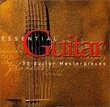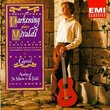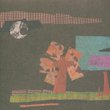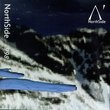| All Artists: Carson Kievman, David Arden Title: Temporary & Tentative Extended Piano Members Wishing: 0 Total Copies: 0 Label: Composers Recordings Release Date: 5/23/2000 Album Type: Import Genres: New Age, Classical Styles: Meditation, Chamber Music, Historical Periods, Classical (c.1770-1830), Modern, 20th, & 21st Century Number of Discs: 1 SwapaCD Credits: 1 UPC: 090438084529 |
Search - Carson Kievman, David Arden :: Temporary & Tentative Extended Piano
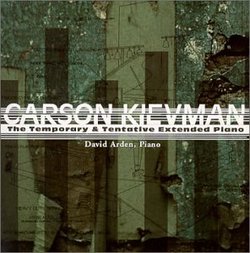 | Carson Kievman, David Arden Temporary & Tentative Extended Piano Genres: New Age, Classical
|
Larger Image |
CD DetailsSimilarly Requested CDs
|
CD Reviews"this music should get the wheels turning" 09/09/2000 (5 out of 5 stars) ""But is this music listenable? Very much so. Kievman writes with craft, humor, and imagination. The first two brief works, Introdictus and Toccatada, are virtuoso cascades of notes, but are tautly conceived, in the manner of the Chopin Etudes. Harpo is a longer, more elastic composition that honors the remarkable combination of focus and freedom in the jazz piano work of Keith Jarrett and the late Bill Evans. Meditation is the most ambitious work on the program, long and full of silences. At 24 1/2 minutes, the piece presents a serious challenge to the patience of the listener for this type of material. Most performances of the monumental slow movement of Beethoven's Hammerklavier are shorter. Does Kievman live up to his audacity? Yes and no. Beethoven is a faulty comparison, as his music is linear and ariose. Kievman seems to be influenced, more than anything, by the primeval rhythms of nature, which do not always correspond to the man-made laws of music in the Western world. In some sections, the pianist plays sparsely arrayed chords as cicadas chirp and streams burble on tape. Elsewhere, the piano mimics the relentless noise of the general ambient landscape. The contrast of the faultless logic of the natural sonic environment and the contemplative, very human exposition of Kievman's musical ideas is poignant and provocative. The composer might disagree, but this sounds like existential music to my ears. This is the antithesis of dentist-office music, but late at night, and with maybe a bottle of good scotch at the side, this music should get the wheels turning. Kievman's interest in the music of nature is overtly confirmed in the piece Nuts & Bolts, which, like his 1995 Symphony ("Hurricane"), was inspired by the composer's own devastating experience during the 1992 hurricane disasters in South Florida, where he lives [NOTE: Carson Kievman now lives in Princeton, New Jersey]. The music is less abstract and intellectual than in Meditation; indeed, it is virtually programmatic. An interesting touch is the inclusion of the "Fate" theme from Beethoven's Fifth Symphony in the coda, an illusion, perhaps, to the composer that most closely resembles a force of nature in the human form. The title work on this CD, The Temporary & Tentative Extended Piano, arrives at the end of the program as a sort of summary of the clutch of musical ideas that Kievman presents in the preceding material. This is a theater work, and there are, we are told, a number of visual effects that enhance the piece. The work is enticing as a stand-alone musical piece, full of humor and surprise. Pianist David Arden, the dedicatee for this 1977 composition, plays it with the same power and intelligence that he displays on the balance of the program." -- Peter Burwasser - FANARE MAGAZINE" It's reminiscent of Arvo Part's music at its most hypnotic 10/03/2000 (5 out of 5 stars) "" "Carson Kievman came to my attention several years ago with his Symphony No. 2(42), a weighty, transcendent and sometimes hallucinatory memorial to Mozart that rang the changes on music from the Viennese composer's Requiem, specifically the "Lacrymosa." When New Albion Records released their recording of Kievman's Symphony No. 2(42) in 1996 (NA081CD), they indicated that a New Albion CD of the composer's complete piano music, as played by David Arden, was forthcoming. That disc never appeared, now it's here, albeit on a different label. The classical music recording industry is full of mysteries! Kievman was born in 1949 and received his Masters of FIne Arts degree from the California Institute of the Arts in 1977. He's spent most of his time in Germany and in the United States, and his music has been used by dance companies and in museums, as well as in the more traditional theaters and concert halls. Recently, Kievman was granted a Naumberg Fellowship to Princeton University. He's been around and received some acclaim, yet I believe that this is only the second all-Kievman CD to become available. This disc's overall title is The Temporary & Tentative Extended Piano, which is the earliest work here, and the last on the CD. It is a kind of mad music theater, one performing version of this piece requires a page-turning "Butler" and several other "Servants," and the pianist sits on aq spring-supported platform where he also has access to cowbells. The work ends with the performer collapsing in exhaustion. It is in this format that the work was performed for Joseph Papp's New York Shakespeare Festival, and page 3 of CRI's booklet has the photograph to prove it. The work starts like Messiaen (a Kievman mentor and becomes progressively more disheveled, as an angry shout from the pianist further suggests! It alternates between obsessive bell-ringing (on the keyboard, more than away from it) and grimly tolling passages in the piano's lower regions. Six minutes in, a vulnerable melody appears in the right hand, but is soon borne away by the vertiginous action that culminates in the pianist's staged breakdown. What it all means is anyone's guess, but it is fun, even without the visual component. The other substancial piece on this CD is Meditation, which was begun in 1992 and completed in 1998. It is in two sections and is 24 minutes long. The booklet describes the first section as "a descent into Hades in slow motion," and Kievman requests very slow tempos from the pianist. The juxtaposition of very loud and very soft chords (with many pregnant pauses in between) creates a frozen or marmorcal effect. Kievman reinforces this effect with nature noises -- thunder, rain, cicadas -- another mysterious choice, but again, one that is moving rather tha New Agey. Later, the music takes on a nostalgic -- but not sweet! -- quality. Bells toll again, both in the piano and apart from it. It's reminiscent of Arvo Part's music at its most hypnotic and personal. The other four works on this CD complement the two featured pieces. All except Harpo (1986, the composer's return to composing after a three-year hiatus) were written in the 1990s. The booklet aptly describes Toccatada as "an almost dadistic toccata... in the spirit of Nancarrow playing Prokofiev playing Bach." The tempo is "as fast as possible." David Arden, a true hero to composers of modern keyboard music, makes Kievman's quirky creations viable. The engineers have gifted Arden and Kievman with good sound. This unusual CD is well worth your explorations." -- Raymond Tuttle -- Classical Net" It's reminiscent of Arvo Part's music at its most hypnotic 09/25/2000 (5 out of 5 stars) ""Carson Kievman came to my attention several years ago with his Symphony No. 2(42), a weighty, transcendent and sometimes hallucinatory memorial to Mozart that rang the changes on music from the Viennese composer's Requiem, specifically the "Lacrymosa." When New Albion Records released their recording of Kievman's Symphony No. 2(42) in 1996 (NA081CD), they indicated that a New Albion CD of the composer's complete piano music, as played by David Arden, was forthcoming. That disc never appeared, now it's here, albeit on a different label. The classical music recording industry is full of mysteries! Kievman was born in 1949 and received his Masters of FIne Arts degree from the California Institute of the Arts in 1977. He's spent most of his time in Germany and in the United States, and his music has been used by dance companies and in museums, as well as in the more traditional theaters and concert halls. Recently, Kievman was granted a Naumberg Fellowship to Princeton University. He's been around and received some acclaim, yet I believe that this is only the second all-Kievman CD to become available. This disc's overall title is The Temporary & Tentative Extended Piano, which is the earliest work here, and the last on the CD. It is a kind of mad music theater, one performing version of this piece requires a page-turning "Butler" and several other "Servants," and the pianist sits on aq spring-supported platform where he also has access to cowbells. The work ends with the performer collapsing in exhaustion. It is in this format that the work was performed for Joseph Papp's New York Shakespeare Festival, and page 3 of CRI's booklet has the photograph to prove it. The work starts like Messiaen (a Kievman mentor and becomes progressively more disheveled, as an angry shout from the pianist further suggests! It alternates between obsessive bell-ringing (on the keyboard, more than away from it) and grimly tolling passages in the piano's lower regions. Six minutes in, a vulnerable melody appears in the right hand, but is soon borne away by the vertiginous action that culminates in the pianist's staged breakdown. What it all means is anyone's guess, but it is fun, even without the visual component. The other substancial piece on this CD is Meditation, which was begun in 1992 and completed in 1998. It is in two sections and is 24 minutes long. The booklet describes the first section as "a descent into Hades in slow motion," and Kievman requests very slow tempos from the pianist. The juxtaposition of very loud and very soft chords (with many pregnant pauses in between) creates a frozen or marmorcal effect. Kievman reinforces this effect with nature noises -- thunder, rain, cicadas -- another mysterious choice, but again, one that is moving rather tha New Agey. Later, the music takes on a nostalgic -- but not sweet! -- quality. Bells toll again, both in the piano and apart from it. It's reminiscent of Arvo Part's music at its most hypnotic and personal. The other four works on this CD complement the two featured pieces. All except Harpo (1986, the composer's return to composing after a three-year hiatus) were written in the 1990s. The booklet aptly describes Toccatada as "an almost dadistic toccata... in the spirit of Nancarrow playing Prokofiev playing Bach." The tempo is "as fast as possible." David Arden, a true hero to composers of modern keyboard music, makes Kievman's quirky creations viable. The engineers have gifted Arden and Kievman with good sound. This unusual CD is well worth your explorations." -- Raymond Tuttle -- Classical Net"
|

 Track Listings (6) - Disc #1
Track Listings (6) - Disc #1
